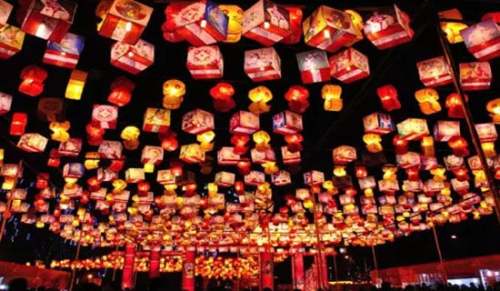- 相关推荐
腊八的来历和习俗英文
腊日常年暖尚遥,今年腊日冻全消。侵凌雪色还萱草,漏泄春光有柳条。纵酒欲谋良夜醉,还家初散紫宸朝。口脂面药随恩泽,翠管银罂下九霄。腊八节快乐,感谢你多年的恩泽福惠。接下来小编整理了腊八的来历和习俗英文,文章希望大家喜欢!

Origin
起源
Laba is celebrated on the eighth day of the last lunar month, referring to the traditional start of celebrations for the Chinese New Year. La in Chinese means the 12th lunar month and ba means eight.
腊八是农历十二月的第八天,是欢庆春节的开始。汉语里,“腊”的意思是第十二个月,“八”的意思是八。
Legends about the origin of this festivity abound. One holds that over 3,000 years ago sacrificial rites called La (腊) were held in the twelfth lunar month when people offered up their preys to the gods of heaven and earth. The Chinese characters for prey (猎) and the twelfth month (腊 La) were interchangeable then, and ever since La has been used to refer to both. Since the festival was held on the eighth day of the Last month, people later appended the number eight (ba in Chinese), giving us the current Laba.
关于这个节日的起源有很多种说法。有一种说法是大约3000年前,一种祭祀仪式叫做“腊”,会在农历十二月举行。人们向天上和地下的神献出他们的猎物。那时候,表示猎物的汉字“猎”和表示农历十二月的“腊”是可以通用的。从那时候起,“腊”就用来指这两种意思了。因为这个节日是在最后一个月的第八天举行的,后来人们就加上了“八”,于是就有了现在的腊八。
Custom
习俗
1. Laba garlic
In most parts of North China, it is customary to soak garlic in vinegar on the eighth day of the twelfth lunar month, which is called "Laba Garlic". The garlic character of Laba garlic is homophonic with the word "calculate". This is when various businesses need to gather accounts on this day and calculate the income and expenditure of the year, which can show the profit and loss. "Laba calculate" is like this. On the day of Laba, the debtor who needs to pay debts should prepare to repay the money by delivering a letter to the person who owes him money. There is a folk saying in Beijing: "Laba Congee, Laba garlic, the messenger who pays the bill, and the repayment of debts." Later, some people who owe money to others use garlic instead of the word "calculate" to show their taboo. To avoid the word "calculate" of the account, in fact, what they owe to others must be paid after all.
To soak Laba garlic, you need to use purple skin garlic and rice vinegar. Remove the old skin from the garlic cloves, immerse them in rice vinegar, and seal them tightly in a small jar. The garlic and vinegar aromas dissolve together, creating a unique taste. It is the best seasoning for eating dumplings, and can also be used with cold dishes.
2. Laba Tofu
"Laba Tofu" is a folk specialty in Qian County, Anhui Province. On this day, every household in Qian County will sun dry tofu, and this naturally sun dried tofu is called "Laba Tofu" by the people. It can be eaten alone or stir fried or stewed with meat. If shrimp and other ingredients are added during sun drying, the Laba tofu made will be incredibly delicious. When entertaining VIPs, the people of Yixian also carved them into animals and flowers, poured sesame oil on them, mixed with seasonings such as scallions, ginger, and garlic, and served them as cold dishes, making them a delicacy for banquets.
3. Laba noodles
In some parts of northern China, people dont eat Laba Congee, but Laba noodles. Laba noodles are made from flour as the main ingredient, along with various ingredients such as beans, mushrooms, algae, meat, vegetables, etc. They are also mainly composed of carbohydrates, taking into account protein, high-quality fatty acids, vitamins, and dietary fiber. They can be said to be a nutritious and healthy food worth promoting.
4. Laba Congee
Laba Congee is a kind of Congee made with a variety of ingredients during Laba Festival. Laba Congee comes from India and India. The eighth day of the twelfth lunar month is the anniversary of the Buddhas enlightenment, commonly known as "Laba Festival", and in Buddhism, it is called "Magic Treasure Festival". The Sacrifice · Suburb Special Animal said that the wax offering was "in December, gathering all things together and enjoying them". Laba Congee was made by combining all kinds of food and cooking together with rice, which means gathering all things together and harmonizing the spirits. The custom of Laba Congee is not owned by Buddhism. As a folk custom, Laba Congee is eaten on December 8 of the lunar calendar to celebrate the harvest, and has been handed down to this day.
【腊八的来历和习俗英文】相关文章:
小年的来历和习俗02-02
端午节的习俗和来历06-02
元宵节的来历和习俗04-10
端午节的来历和习俗及诗句04-13
小年祭灶习俗的来历和传说02-02
关于元宵节的来历和习俗02-21
腊八节的由来和习俗01-19
小暑的来历与习俗07-06
关于腊八节的由来和习俗01-18
介绍端午节来历习俗的作文06-20
